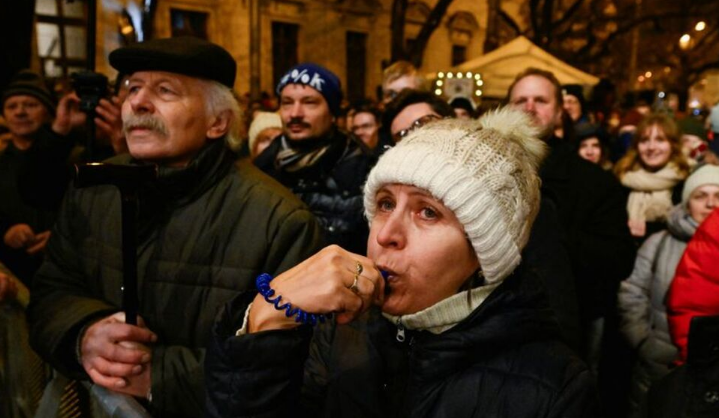Tuesday saw a minimum of 15,000 protesters gather in Slovakia’s capital against Prime Minister Robert Fico’s administration’s intentions to speedily amend criminal laws, including the dismantling of a special prosecutor’s office that targets corruption.
Slovak Republic, a country in central Europe home to over 5.4 million people, has seen protests organized by opposition groups for the past three weeks running. Protesters in Bratislava hoisted Slovak and EU flags while shouting „Enough of Fico.“
The Dennik N news website reports that there were 10,000 demonstrators a week ago, and today there are between 15,000 and 18,000.
Since taking office in October, the newly elected government has been working to speed up the parliamentary process by which suggestions are being considered and potentially passed. Some of the suggestions include weakening penalties for financial crimes, limiting protections for whistleblowers, and doing away with a special prosecutor’s office that handles high-profile bribery cases.
Slovakia has been warned by the European Commission that it would face consequences if it violates EU laws.
The opposing parties have threatened to use whatever means necessary to undermine the reform proposals.
Speaking to the massive crowd, Progressive Slovakia’s leader Michal Simecka said, „(The government) is) underestimating us.“ They are the biggest opposition party in parliament.
We must inform them that they are mistaken. Even in the dead of winter, before the holiday season even begins, we must show them that we will not rest until we get democracy and justice.
One of the demonstrators, Patrik Kamencay, a 25-year-old expressed his displeasure with Slovakia’s portrayal in the EU.
„The government comes with big promises about… how it will improve the lives of citizens,“ the elected official said. „And the first thing it does is try to distort the criminal procedure and abolish the special prosecutor’s office.“
The four-time prime minister Fico resigned in 2018 after large-scale anti-corruption protests that followed the murder of an investigative journalist. Fico has claimed that the special prosecutor’s office was politically driven and that its actions violated human rights. Massive anti-corruption protests were taking place when Fico resigned.
The government was expected to enact the legislation before Christmas, but administration officials have hinted that a vote would be postponed until January.
A lot of people, including activists and opposition members, are upset about the changes that the new government has made in its first few months in office.
This month, a group of groups fighting for press freedom warned that plans to cut financing for state broadcaster RTVS and split it into radio and television segments would undermine the station’s autonomy and endanger press freedom generally.
In an open letter sent Monday to the government and lawmakers, the heads of anti-monopoly and healthcare regulatory watchdogs urged them to reject proposed legislative amendments that might influence the appointment of future chairs to their respective offices. According to the letter, these modifications would put the chairs at the mercy of the government’s political will.
(This article was edited by Josie Kao and contributed to by Radovan Stoklasa in Bratislava and Jason Hovet in Prague.)

